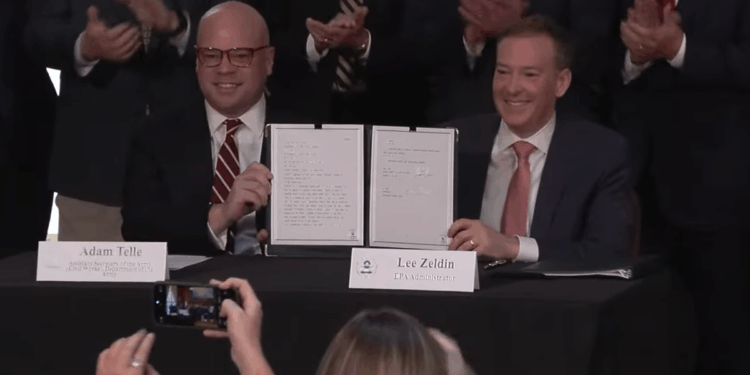The Trump administration is about to curb an overzealous Obama-era environmental regulation by revising the definition of “Waters of the United States” (WOTUS) under the Clean Water Act.
U.S. Environmental Protection Agency (EPA) Administrator Lee Zeldin and Adam Telle, assistant secretary of the Army for Civil Works, introduced a proposed WOTUS rule change Monday that is meant to establish a clear, durable definition of the rule that won’t be changed every time a new administration comes in. There will be 45 days of public comment on the proposed rule once it is published.
A rule change was ordered in 2023 after the U.S. Supreme Court decision on Sackett v. EPA. The Biden administration issued an amended WOTUS rule that year, but that action did not allow for public input and failed to fully implement the court’s direction to conform to the court’s new, limited interpretation of WOTUS, according to an EPA press release.
To understand how all this relates to land use and puddles of water that develop during heavy rains, it helps to go back to 2015, when the EPA and Army Corps of Engineers promulgated the Clean Water Rule, which included the “significant nexus” standard. It called for protection of all waters with a significant nexus to “downstream traditional navigable waters.” The result was that a lot of land that was usable before the rule became useless.
In Sackett v. EPA, the Sacketts bought a residential lot but were prevented from building a house on it because the land had wetlands leading to a creek that led to a lake. The EPA decided the wetlands were considered a “significant nexus” of the navigable WOTUS. At one point, the EPA threatened the Sacketts with $40,000-a-day fines. But the Supreme Court ruled in their favor in 2023.
The significant nexus rule meant that a ditch in a rainstorm, a tiny creek that only occasionally appears, or pooling water that occurs only in the rainy season could prevent land use. The definition of WOTUS has been unclear, and the consequences for landowners were immense, especially in agriculture.
“For too long there’s been a great deal of uncertainty about this term, Waters of the United States Rule. Unfortunately, it left many people holding the bag — farmers, contractors, small business owners — guessing whether their ephemeral stream or a backyard ditch was going to be classified as a Waters of the United States Rule, and potentially subject them to significant penalties,” West Virginia Gov. Patrick James Morrisey said Monday in Washington, D.C., during an event promoting the proposed rule. He called the old rule a “textbook example of federal overreach.”
According to a press release, these are the key proposed revisions:
•Defining key terms like “relatively permanent,” “continuous surface connection,” and “tributary” to appropriately delineate the scope of WOTUS consistent with the Clean Water Act and Supreme Court precedent;
•Establishing that jurisdictional tributaries must connect to traditional navigable waters either directly or through other features that provide predictable and consistent flow;
•Reaffirming that wetlands must be indistinguishable from jurisdictional waters through a continuous surface connection, which means that they must touch a jurisdictional water and hold surface water for a requisite duration year after year;
•Strengthening state and tribal decision-making authority by providing clear regulatory guidelines while recognizing their expertise in local land and water resources;
•Preserving and clarifying exclusions for certain ditches, prior converted cropland, and waste treatment systems; Adding a new exclusion for groundwater; and
•Incorporating locally familiar terminology, such as “wet season,” to help determine whether a water body qualifies as WOTUS.
Zeldin said Monday that he expects the proposed simplified WOTUS definition will bring relief and happiness to landowners who have been looking for a “simple, prescriptive definition that the whole country can operate off of, and would allow individuals to know whether or not there’s a Water of the United States without having to go hire an attorney or a consultant — having to pay someone to tell them.”
Beth Brelje is an elections correspondent for The Federalist. She is an award-winning investigative journalist with decades of media experience.

















